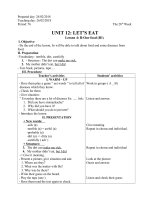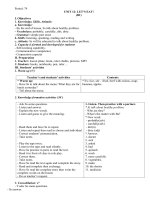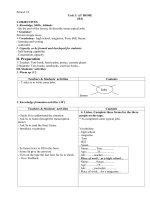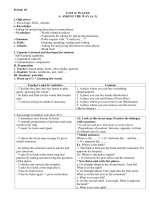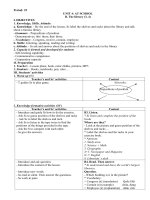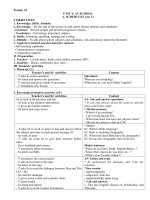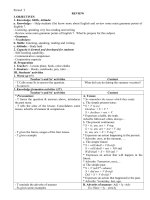unit 12 let s eat tiếng anh 7 sách cũ nguyễn văn liệt thư viện giáo án điện tử
Bạn đang xem bản rút gọn của tài liệu. Xem và tải ngay bản đầy đủ của tài liệu tại đây (119.14 KB, 5 trang )
<span class='text_page_counter'>(1)</span><div class='page_container' data-page=1>
Period: 79
<b>UNIT 12: LET’S EAT!</b>
<b>(B1)</b>
<b>I. Objectives</b>
<i><b>1. Knowledge, Skills, Attitude: </b></i>
<i><b>a. Knowledge:</b></i>
- By the end of lesson, Ss talk about healthy problem.
<i><b>- Vocabulary: probably, carefully, dirt, dirty.</b></i>
<i><b>- Grammar: simple past tense</b></i>
<i><b>b. Skills: listening, speaking, reading and writing</b></i>
<i><b>c. Attitude: Ss will be educated to talk about healthy problem.</b></i>
<i><b>2. Capacity is formed and developed for students</b></i>
- Self-learning capability.
- Communicative competence
- Cooperation capacity
<b>II. Preparation</b>
<i><b>1. Teacher: lesson plane, book, color chalks, pictures, MP3</b></i>
<i><b>2. Students: books, notebooks, pen, ruler …</b></i>
<b>III. Students’ activities</b>
<i><b>1. Warm up (5’)</b></i>
<b>Teacher’s and students’ activities</b> <b>Contents</b>
<b>* Warm up:</b>
- Have Ss to talk about the menu: What they ate for
lunch yesterday?
- Tell about the menu.
* Ex: rice, stir – fried, beef with onions, soup,
bananas, apples.
<i><b>2. Knowledge formation activities (36’)</b></i>
- Ask Ss some questions.
- Listen and answer.
- Explain the new words.
- Listen and guess to give the meaning.
- Read them and have Ss to repeat
- Listen and repeat then read in chorus and individual.
- Correct students’ pronunciation.
- Take notes.
- Play the tape twice.
- Listen to the tape and read silently.
- Have Ss practice in pairs to read the text.
- Read it in front of class in role play.
- Correct them.
- Take notes.
- Have Ss read the text again and complete the story.
- Read and complete then exchange.
- Have Ss read the complete story then write the
complete words on the board.
- Do as teacher’s request.
<b>1. Listen. Then practice with a partner.</b>
<i>* Ss talk about healthy problem.</i>
- Who are they?
- What’s the matter with Ba?
* New word.
- probably(adv)
- carefully(adv)
- dirt(n)
- dirty (adj)
* Answer:
1. doctor
2. sick
3. asked
4. had
5. spinach
6. wash
7. more carefully
8. vegetables.
9. make
10. the doctor
11. medicine
<i><b>3. Consolidation: 4’</b></i>
</div>
<span class='text_page_counter'>(2)</span><div class='page_container' data-page=2>
1. Why did Ba go to the doctor?
2. What did he eat?
3. What can be dirty?
4. Do you often help your mom?
<b>IV. Experience:</b>
………
………
………
Period: 80
<b>UNIT 12: LET’S EAT!</b>
<b>B2, 4</b>
<b>I. Objectives</b>
<i><b>1. Knowledge, Skills, Attitude: </b></i>
<i><b>a. Knowledge:</b></i>
- By the end of lesson, Ss talk about healthy problem.
<i><b>- Vocabulary: balanced, diet, affect, moderate, amount, energy, body- building food, dairy product, </b></i>
cereal, lifestyle.
<i><b>- Grammar: simple past tense.</b></i>
<i><b>b. Skills: listening, speaking, reading and writing</b></i>
<i><b>c. Attitude: Ss will be educated to talk about healthy problem.</b></i>
<i><b>2. Capacity is formed and developed for students</b></i>
- Self-learning capability.
- Communicative competence
- Cooperation capacity
<b>II. Preparation</b>
<i><b>1. Teacher: lesson plane, book, color chalks, pictures, MP3</b></i>
<i><b>2. Students: books, notebooks, pen, ruler …</b></i>
<b>III. Students’ activities</b>
1. Warm up (5’)
<b>Teacher’s and Students’ activities</b> <b>Contents</b>
- Ask Ss some questions about the food they like to
eat.
- Give feedback
1. What is your favorite food?
2. What do you often have for breakfast/ dinner/
lunch?
3. Do you like eating sugar?
4. Do you go on a diet?
<i><b>2. Knowledge formation activities (36’)</b></i>
- T elicites the topic and teaches new words
- Ss listen and answer the questions, find out new
words
<b>B2: Listen and read:</b>
<i>* Ss talk about healthy problem.</i>
+ Ask and answer some questions.
What’s a balanced diet?
What kind of good are:
- Body – building foods?
- Energy giving foods?
<b>+ New words:</b>
<b>- an amount of:(n)</b>
- a diet: (n)
- balanced: (adj)
- moderate: (adj)
- energy: (n)
- (to) effect: (v)
- lifestyle
</div>
<span class='text_page_counter'>(3)</span><div class='page_container' data-page=3>
- T asks Ss to listen to the tape once or twice.
- T asks Ss to read the passage to themselves.
- Ss read the passage aloud to the class.
- Ss read over questions a) - c)
- Ss work in pairs and answer questions from a to
c
- Compare their answers with their partners.
- Call on Ss to give the answers in front of the
class.
- Some Ss give the answers in front of the class.
- T makes any necessary corrections
<b>+ Answer:</b>
a. Sugar adds taste to food and it gives you energy.
b. A balanced diet alone isn’t enough, all people
need exercise to keep a health life.
c.Yes I do.
- Have students study the pictures for a few
minutes and answers the questions.
- Have students listen to the tape once or twice.
- Have students listen to the tape again and write
the letters or Lan, Nga, Ba and Hoa ate and
drank.
- Give Ss listen on the tape the 2nd<sub> time </sub>
- Ask Ss listen one more and check the answer
with a partner
- Call Ss answer aloud and write them on the
black board
- Correct mistakes them.
<b>B4: Listen and write the letter of they ate and </b>
<b>drank.</b>
<i>* Ss complete the things what Lan, Ba, Hoa and </i>
<i>Nga ate or drank.</i>
<b>- Answer the questions.</b>
+ What’s this?
+ Are they vegetable?
<b>- Listen the tape:</b>
For her lunch, Lan had beef with noodles and
vegetables. She had juice too. Ba chose fish and
rice and some fruit. He drank some water. Nga ate
rice and vegetables and drank juice. Hoa had
noodles and some fruit. She had juice, too.
<b>+ Answer:</b>
Lan: b, d, f, g.
Ba: c, a, e, h.
Nga: a, d, g.
Hoa: b, e, g.
<i><b>3. Consolidation (4’)</b></i>
- Ask Ss answer about Ba, Hoa, Lan and Nga
- Correct mistakes them
- Answer about Ba, Hoa, Lan and Nga
+ What did Lan have for her lunch?
+ What about Ba, Hoa, Nga?
<b>IV. Experience:</b>
………
………
………
Period: 81
<b>LANGUAGE FOCUS 4</b>
<b>I. Objectives</b>
<i><b>1. Knowledge, Skills, Attitude: </b></i>
<i><b>a. Knowledge:</b></i>
- By the end of lesson, Ss use the past simple, indefinite quantifier, too, so, either and neither.
<i><b>- Vocabulary: review unit 12</b></i>
<i><b>- Grammar:</b></i> + Past simple tense
+ Indefinite quantifiers
+ Too, so, either, neither.
+ Imperatives
<i><b>b. Skills: listening, speaking, reading and writing</b></i>
<i><b>c. Attitude: Ss use the past simple, indefinite quantifier, too, so, either and neither.</b></i>
<i><b>2. Capacity is formed and developed for students</b></i>
</div>
<span class='text_page_counter'>(4)</span><div class='page_container' data-page=4>
- Communicative competence
- Cooperation capacity
<b>II. Preparation</b>
<i><b>1. Teacher: lesson plane, book, color chalks, pictures, MP3</b></i>
<i><b>2. Students: books, notebooks, pen, ruler …</b></i>
<b>III. Students’ activities</b>
1. Warm up (5’)
<b>Teacher’s and Students’ activities</b> <b>Content</b>
- T asks Ss to write some past verbs.
- Ss write on the board.
* Past verbs.
- wrote
- ...
<i><b>2. Knowledge formation activities (32’)</b></i>
<b>Teacher’s and Students’ activities</b> <b>Content</b>
<i><b>* Activity 1.</b></i>
- T asks Ss to review the form and use of past
simple tense.
- T gives some examples.
- Ss listen and copy.
- T asks Ss to look at the pictures/ 123 then ask
and answer questions using past simple tense.
- T calls on some pairs to practice before class.
- T checks and corrects the answers.
<b>1. Past simple tense.</b>
<i>* Ss use past simple to ask and answer.</i>
<i><b>* Form: To be : S + was/ were + O</b></i>
<b> V : S + V- ed / V2 + O …</b>
<i><b>* Use: yesterday, ago, last …., 2004 …</b></i>
Ex: He started learning English in 1990
Where were you last night? I was at home.
1/ P 123,124.
<i><b>* Keys:</b></i>
b. No, I didn’t. I ate at a food stall.
c. No, I didn’t. I went to the movie theater
d. No, I didn’t. I read story
e. No, I didn’t. I played football.
<i><b>* Activity 2.</b></i>
- T reviews some indefinite quantifiers and its
use.
- Ss listen and copy into their book.
- T asks Ss to use the words in the box to match
the pictures and write expression.
- Ss do exercises.
- T asks Ss to fill in the gaps with suitable words
from the box to complete the dialogues.
- T asks Ss to read their answers loudly.
- T checks and corrects their answers.
<b>2. Indefinite quantifiers.</b>
<i>* Ss know the way to use indefinite quantifiers.</i>
- A little + uncountable N
- A lot of/ lots of + (un)countable N
- too much + uncountable N
* 2/ P124
A, A: a little coffee
B: a lot of
C: a little sugar
D: a lot of salt
E: too much coffee
B, A: a little/ lots of/ a little
B: a lot of
C: too much
D: a little
<i><b>* Activity 3.</b></i>
- T asks Ss to review the use of too/ either.
- T gives some examples.
- Ss listen and copy.
- T asks Ss to work in pairs to practice the
dialogues.
- Ss work in pairs.
- T asks Ss to practice loudly.
<b>3. too and either.</b>
<i>* Ss use structures: too/ either.</i>
* So, too: dùng trong câu kđ
Neither/ not ... either: dùng trong câu pđ
- So / Neither: đứng đầu câu, phải đảo ngữ
- Too/ either: đứng ở cuối câu. Trước too có dấu
phẩy.
Ex: I am a student
She is a student, too. / So is she.
- T asks Ss to use 9 pictures / 126 to make up
similar dialogue.
I don’t like milk
</div>
<span class='text_page_counter'>(5)</span><div class='page_container' data-page=5>
- T asks Ss to work in pairs to practice.
- T asks Ss to practice loudly.
- T checks and corrects the mistakes.
a/ Read the dialogues.
Ba: I like mangoes.
Nam: I like mangoes,too.
b/ Make up similar dialogues.
A: I don’t like papaya.
B: Neither do I.
<i><b>* Activity 4.</b></i>
- T asks Ss to review the use of so/ neither.
- T asks Ss to work in pairs to practice the
examples.
- Ss work in pairs.
- T asks Ss to practice loudly.
- T asks Ss to use 9 pictures / 126 to make up
similar dialogue.
- T asks Ss to work in pairs to practice.
- T asks Ss to practice loudly.
- T checks and corrects the mistakes.
<b>4. so and neither</b>
<i>* Ss use structures: so/ neither.</i>
Examples on page 127.
Make up eight dialogues with so and neither.
<i><b>* Activity 5.</b></i>
- T reminds Ss of imperatives.
- Ss listen and take note.
- T asks Ss to look at the pictures on page 128
and complete the instructions by using the verbs
from the box.
- T calls on some Ss to give the answer.
- Ss read the answers loudly.
<b>5. Imperatives.</b>
a. peel b. wash c. slice d. mix e. add f. stir
g. wait.
<i><b>3. Consolidation: 4’</b></i>
- T reminds the knowledge that they have learnt.
<b>IV. Experience:</b>
………
………
………
<b>Signature of the Leader</b>
</div>
<!--links-->
